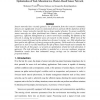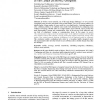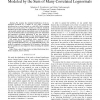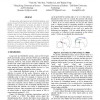129 search results - page 7 / 26 » Scale-free, self-organizing very large sensor networks |
140
Voted
APCHI
2008
IEEE
15 years 7 months ago
2008
IEEE
Denial of Sleeping is a novel type of potential attacks in wireless network. The object of the attack is a sensor node’s power supply. To make sensors inexpensive so that they ca...
125
Voted
ISCC
2003
IEEE
15 years 6 months ago
2003
IEEE
Sensor networks have recently gained a lot of attention from the research community. Sensors are significantly resource-constrained devices and last till the depletion of their ba...
125
Voted
IJAHUC
2007
15 years 19 days ago
2007
: In wireless sensor networks, one of the main design challenges is to save severely constrained energy resources and obtain a long system lifetime. Low cost of sensors enables us ...
WCNC
2008
IEEE
15 years 7 months ago
2008
IEEE
Abstract—We examine the statistical distribution of the interference produced by a cluster of very many co-channel interferers, e.g., a sensor network, or a city full of active w...
119
Voted
ICPP
2008
IEEE
15 years 7 months ago
2008
IEEE
In large-scale, self-organized and distributed systems, such as peer-to-peer (P2P) overlays and wireless sensor networks (WSN), a small proportion of nodes are likely to be more c...




